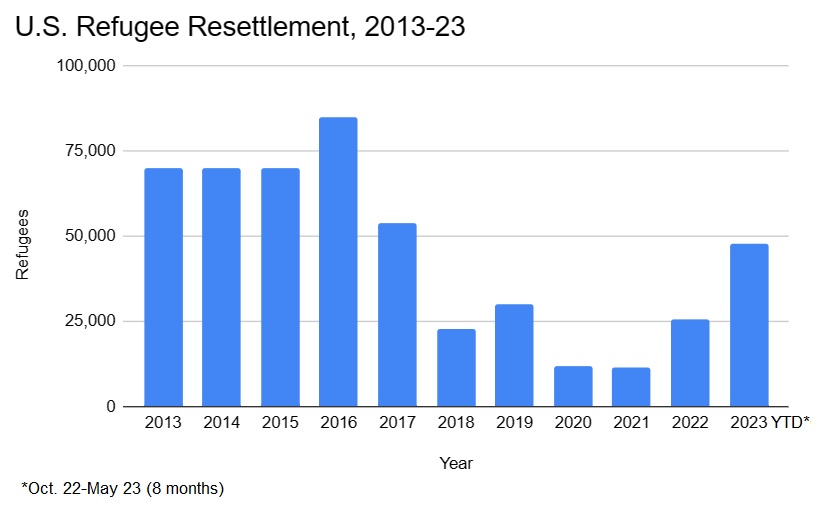There’s a disconnect, a “market gap,” between the agencies charged with securing housing for newly arriving refugees and landlords who rent to them, Joe Landis said.
Landis saw the issues first-hand when he worked as a housing specialist at Church World Service. It was a constant scramble to secure housing for new arrivals, leaving little time for the other aspects of his job.
“It felt pretty tenuous,” he said.
Now a graduate student in city planning at Massachusetts Institute of Technology, he is proposing a solution. In collaboration with two colleagues, he is launching ReHome, an online rental platform tailored specifically for refugee resettlement.
Developed over the past six months, it has just been rolled out for beta testing in Lancaster County, with the goal of taking it nationwide early next year. It has already been used to place several families locally.

Landis’ business partners are Zach Moring, co-founder and chief technical officer, who is a master’s degree student in computer science at Boston University; and Tom Nguyen, a chemical engineering undergraduate at MIT, who is product lead.
The three held a presentation last week at Southern Market Center to introduce ReHome to local landlords, resettlement agencies and representatives of the Lancaster County Community Foundation.
There are significant differences between a conventional apartment hunt and one for a refugee household. First, agencies typically act on behalf of households that haven’t arrived yet. Usually, they try to secure an apartment and get it furnished and for a family upon arrival. Often, they’re notified just one to three weeks in advance.
For landlords, that’s not the timeline they’re used to. They typically expect to meet their prospective renters, have them sign a lease and only then grant access to a property.
Second, refugee families don’t yet have the standard proofs of financial wherewithal that landlords expect — pay stubs and U.S. credit histories. Instead, agencies guarantee payment for an initial period while a household’s breadwinners secure jobs.
ReHome’s process is designed accordingly. Initially, landlords provide listings and dates of availability, which agencies can search. When an agency finds a potential match, it notifies the landlord. If it’s a go, both parties fill out “commitment forms,” confirming financial details, arranging mutually satisfactory logistics and so on.
ReHome thus offers “one clear process to unify everyone,” Landis said, providing a streamlined one-stop shop for refugee resettlement.
Landlord Jon Knaub, who got to know Landis when Landis was at CWS, said he thinks ReHome “definitely meets a need.” Staff turnover at resettlement agencies is common, so a platform that shortens the learning curve and simplifies the apartment search process should be helpful.
“I think this is fantastic,” said Andrew Mashas, CWS community sponsorship developer.
It is a crucial time to make it easier and quicker for resettlement agencies to secure housing, Landis said, because the U.S. is in the process of rebuilding its refugee pipeline and dramatically expanding admissions.

Under President Trump, annual refugee admissions were capped at 15,000 and actual totals dropped below 12,000. The Biden administration’s current target is 125,000, though it is still well short of that number. Advocacy groups are calling for pushing the number higher still, to 200,000 or more.
Over the next few months, ReHome will be put through its paces, with participation limited to the Lancaster County area. Agencies and landlords elsewhere who want to sign up will be put on a waiting list.
Lancaster’s robust network of resettlement agencies, partner organizations and volunteers makes it an ideal proving ground: The ReHome team is looking for open dialogue with all stakeholders, Landis said, to make the platform the best it can be.
Based on the site’s performance and user feedback, Landis, Moring and Nguyen will work the bugs out and finalize the feature set. The hope is to launch in January, when Landis graduates.
To date, ReHome has received about $43,000 in seed funding from MIT’s Sandbox Innovation Fund, Martin Trust Center and the Priscilla King Gray Center for Public Service. The team is seeking additional grant funding, Landis said.
During the beta period, ReHome is free. Following its 2024 launch, it will generate revenue by charging agencies a fee for each rental match. Only accredited agencies have access to listings.
Ideally, ReHome will become a clearinghouse for other refugee-oriented services, such as translation, the team said. That will both enhance its utility and provide additional revenue-generating opportunities.
The more that barriers can be lowered, the easier it can be made for landlords to serve the resettlement market, the better, Landis said.
“At the end of the day,” he said, “people’s lives are at stake here.”







